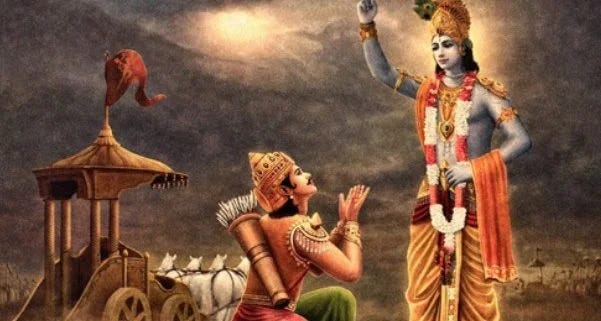The Bhagavad Gita, often referred to as the Gita, is one of the most revered texts in Hindu philosophy. It is a 700-verse dialogue between Prince Arjuna and Lord Krishna that takes place on the battlefield of Kurukshetra. The Gita serves as a spiritual and philosophical guide, offering timeless wisdom on how to lead a righteous and fulfilling life. In this article, we will explore the significance of the Bhagavad Gita, its key shlokas, and resources where you can explore this profound text.
The Essence of the Bhagavad Gita
The Gita is part of the Indian epic, the Mahabharata, and is often considered a standalone scripture due to its deep insights into life, duty (Dharma), and the nature of existence. It was revealed to Arjuna in a moment of profound doubt and moral confusion on the eve of a great war. Lord Krishna, who serves as Arjuna's charioteer, imparts spiritual wisdom to him, helping him overcome his inner turmoil and choose the path of righteousness.
The Gita is a philosophical dialogue that addresses several important aspects of life:
Dharma (Duty): What is the right action in different circumstances?
Yoga: Different paths to spiritual realization, including Karma Yoga (the yoga of selfless action), Bhakti Yoga (the yoga of devotion), and Jnana Yoga (the yoga of knowledge).
Self-realization: Understanding the nature of the self and the Supreme Reality.
Detachment and Equanimity: How to approach life's challenges with calmness and clarity.
Key Shlokas of the Bhagavad Gita
The Bhagavad Gita is filled with shlokas (verses) that convey powerful messages. Some of the most significant shlokas include:
Chapter 2, Shloka 47 – Karma Yoga (The Yoga of Selfless Action)
"Your right is to perform your duty only, but never to its fruits. Let not the fruits of action be your motive, nor let your attachment be to inaction."
This verse teaches the importance of focusing on one's duties without attachment to the results. It advocates for selfless action, where the individual performs their duties without expecting rewards, thus maintaining inner peace and fulfillment.
Chapter 2, Shloka 19 – The Immortal Soul
"The soul is never born, and it never dies; it is not slain when the body is slain."
This verse emphasizes the immortality of the soul. It is a key teaching in Hindu philosophy that the soul transcends physical death, reinforcing the idea of eternal existence beyond the material world.
Chapter 4, Shloka 7-8 – Divine Incarnation
"Whenever there is a decline in righteousness and an increase in unrighteousness, O Arjuna, at that time I manifest myself on earth."
These verses express the idea that whenever the world is in moral turmoil, the divine incarnates in a human form to restore balance and righteousness.
Chapter 18, Shloka 66 – Surrender to the Divine
"Abandon all varieties of religion and just surrender unto Me. I shall deliver you from all sinful reactions; do not fear."
This is one of the most powerful shlokas in the Bhagavad Gita. Lord Krishna advises Arjuna to surrender completely to the divine will, leaving behind all doubts and fears, and in return, the divine will offer protection.
The Relevance of the Bhagavad Gita Today
The Bhagavad Gita's teachings are incredibly relevant in today's fast-paced and often chaotic world. It provides a moral and ethical framework that can help individuals navigate the challenges of life, offering insights on how to balance duty, personal growth, and spiritual fulfillment. The Gita's timeless wisdom helps individuals deal with stress, find clarity of purpose, and live a life of integrity and peace.
Personal Development: The Gita guides individuals to focus on self-awareness, cultivate inner strength, and align with their true nature.
Leadership and Decision Making: The teachings of Krishna, especially in terms of duty and selfless action, can be applied in leadership and decision-making.
Emotional Well-being: The Gita emphasizes the importance of emotional balance and mental peace, making it an essential tool for stress management and emotional well-being.
Where to Buy the Bhagavad Gita
For those interested in exploring the Bhagavad Gita, there are several resources available. Whether you prefer traditional print books or digital formats, here are some options where you can buy or read the Bhagavad Gita:
Print Editions:
Amazon: The Bhagavad Gita is available in various editions, including translations, commentaries, and illustrated versions. You can choose from works by renowned authors like Swami Vivekananda, Eknath Easwaran, or A.C. Bhaktivedanta Swami Prabhupada.
Buy Bhagavad Gita on Amazon
Digital Versions:
Google Books: You can find free versions of the Bhagavad Gita online with translations and commentaries.
Bhagavad Gita App: Many apps are available that offer the Bhagavad Gita with translations and audio options for easy reading on the go.
Local Bookstores and Temples:
Many local bookstores, particularly those that focus on spiritual and religious texts, carry copies of the Bhagavad Gita. Additionally, temples across India and the world often sell copies of the Gita.
The Bhagavad Gita is more than just a religious scripture. It is a guide to living a life of purpose, wisdom, and peace. The teachings of Lord Krishna resonate with people from all walks of life, offering valuable insights into how we can live harmoniously with ourselves and the world around us. Whether you're seeking spiritual enlightenment or practical wisdom for everyday challenges, the Bhagavad Gita has something profound to offer.
If you haven't already explored this sacred text, consider reading it today and experience its timeless wisdom for yourself.


